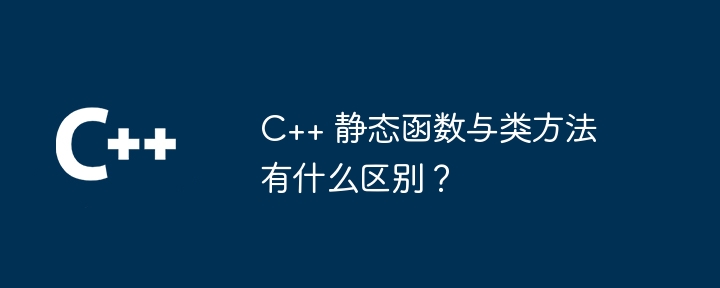Home >Backend Development >C++ >What is the difference between C++ static functions and class methods?
What is the difference between C++ static functions and class methods?
- WBOYWBOYWBOYWBOYWBOYWBOYWBOYWBOYWBOYWBOYWBOYWBOYWBOriginal
- 2024-04-16 11:27:01850browse
The difference between static functions and class methods in C: declaration method: static functions use the static keyword, and class methods are class member functions. Access method: Static functions are accessed through class names or scope resolution operators, and class methods are accessed through class object member access symbols. Data member access: Static functions cannot access class data members, but class methods can access all data members of the class. Purpose: Static functions are suitable for functions that have nothing to do with the class and do not need to access class state. Class methods are suitable for functions that need to access class data.

The difference between static functions and class methods
In C, static functions and class methods are two types of functions , which have different properties and usage. Understanding the difference between them is important to writing code efficiently.
Static function
-
Declaration: Declared using the keyword
staticand does not belong to any class. - Access: Can be accessed through the class name or the scope resolution operator (::).
- Data member access: The data members of the class cannot be accessed.
- Usage: Suitable for functions that have nothing to do with the class and do not need to access the class state.
Class method
- Declaration: It is declared as a member of the class and defined as a member function.
- Access: Accessed through the member access symbol (.) of the class object.
- Data member access: All data members of the class (public, protected and private) can be accessed.
- Usage: Suitable for functions that need to access class data, such as modifying object status, obtaining object information, etc.
Practical case
Consider the following code:
class Person {
public:
static int getAgeLimit() { return 18; } // 静态函数
void printName() { cout << name << endl; } // 类方法
private:
string name;
};Use static function:
int ageLimit = Person::getAgeLimit(); // 访问静态函数 cout << "Age limit: " << ageLimit << endl;
Use class methods:
Person person("John"); // 创建类对象
person.printName(); // 访问类方法Difference summary
| Features | Static function | Class method |
|---|---|---|
| Declaration method | Keywordstatic
|
Member Function |
| Access method | Class name or scope resolution operator | Class object member access symbol |
| Data member access | Cannot access | Can access |
| Purpose | Class-independent functions | Operations that require access to class data |
The above is the detailed content of What is the difference between C++ static functions and class methods?. For more information, please follow other related articles on the PHP Chinese website!

